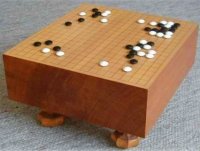I just unearthed this e-mail to my dad from 1995. He was coming to visit me and Andrea but was wary of staying under the same roof as Alex, who was then a very energetic dog. My dad and dogs — not so much. (Actually, once upon a time, me and dogs not so much, but Alex worked her doggie magic and changed me. As it turned out, she did the same for my dad.)
Answers to Frequently Asked Questions about Alex
1. When Alex charges at me, should I cringe? Is she attacking?
No — she’s giving an enthusiastic greeting. If you cringe or block her, you’re telling her in clear body language, “I have no desire to become acquainted with you.” This is in direct opposition to the purpose of nearly every dog: to make friends.
If instead of cringing, you kneel down to greet her and give her a few moments of attention, she’ll be satisfied. Otherwise… well, imagine how you’d feel if someone came into your house and, every time you held out your hand and said, “Hi, I’m your host,” you got a cold shoulder?
2a. When Alex barks, is it because she hates me?
Not at all. When you’re accustomed to communicating only with humans, the language of dogs can be bewildering and misleading. There are only two words in the dog vocabulary that mean “I don’t like you”: a low growl (I don’t trust you, keep your distance), and a teeth-baring snarl (I am preparing to attack). Neither can be mistaken for the series of loud, repeated barks that is Alex’s customary way of greeting newcomers to the house. It usually takes about five minutes until Alex is all barked out.
2b. So if barking doesn’t mean she hates me, what does it mean?
Any or all of the following: “Welcome to my house!” “This is my couch!” “I seem to remember your smell!” “Maybe later we can play!” “Check out how impressive I sound!” “Bob and Andrea sure seem excited to see you!”
3. Why, when I try to make nice with Alex, does she keep her distance?
It’s because she’s afraid of you. You’re so much bigger than she is! When you heave your massive bulk in her direction, naturally she retreats.
The proper way to put a dog at ease is to make yourself small, either by kneeling or by sitting. Permit the dog to come to you. Remember, the dog is nervous and can only be reassured by (a) smelling you and (b) trusting that you won’t exploit his or her vulnerability. This means staying put while the dog checks you out. After you’ve been given a once-over, you can reach out your hand to pet the dog. But again, simply reaching out your hand can be misinterpreted, so before you go to pet the dog, hold your hand out for inspection — palm up, under the dog’s chin, never over the dog’s head.
4. Those teeth! Those claws! I’ll be torn to shreds!!
No, you won’t. Even when I play rough with Alex — where the object seems to be for Alex to immobilize one of my hands between her teeth while we’re both swatting at each other’s faces — I get nothing more than a few red marks and tooth impressions on my skin. In seven years there’s never been even a drop of blood, and there’s been plenty of roughhousing. The worst that’s ever happened is, we’re tumbling around on the floor and Alex’s head comes up under my chin and gives me a solid uppercut, knocking my jaws together and making my ears ring. Ow.
In fact, when on occasion I feel our playing is becoming too rough, I’m always able to tell Alex to take a breather, and I make sure she knows it’s all fun and games by asking her to give me a kiss, which she never fails to do.
So don’t worry.
 The appeal of Go lies in the dichotomy between the extreme simplicity of its rules and the unbelievably rich complexity of the gameplay to which they give rise. Its stark aesthetics are striking too: the ideal Go board is a thick block of beautiful blonde wood, its playing surface a grid of thin black lines (laid down with
The appeal of Go lies in the dichotomy between the extreme simplicity of its rules and the unbelievably rich complexity of the gameplay to which they give rise. Its stark aesthetics are striking too: the ideal Go board is a thick block of beautiful blonde wood, its playing surface a grid of thin black lines (laid down with  A love poem for my wife, in
A love poem for my wife, in 

 A few nights ago I was in my study while the kids were jumping around in the bedroom, playing “pirates.” The sounds of mock swordfights filled the air… until suddenly they didn’t. All was silent for several moments. My parental Spidey-sense tingled and I got up to see what they were up to. I found Archer lying prone and smirking on the bed, Jonah leaning over him. Jonah looked up and explained to me, “He drank too much rum.”
A few nights ago I was in my study while the kids were jumping around in the bedroom, playing “pirates.” The sounds of mock swordfights filled the air… until suddenly they didn’t. All was silent for several moments. My parental Spidey-sense tingled and I got up to see what they were up to. I found Archer lying prone and smirking on the bed, Jonah leaning over him. Jonah looked up and explained to me, “He drank too much rum.”